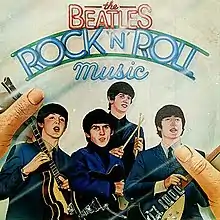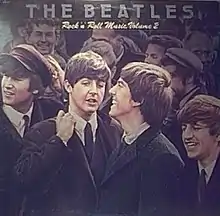| Rock 'n' Roll Music | ||||
|---|---|---|---|---|
 | ||||
| Compilation album by | ||||
| Released | 7 June 1976 | |||
| Recorded | 1963–1970 | |||
| Studio | EMI and Apple studios, London | |||
| Genre | Rock & roll | |||
| Length | 73:45 | |||
| Label |
| |||
| Producer | George Martin | |||
| The Beatles chronology | ||||
| ||||
| Singles from Rock 'n' Roll Music | ||||
| ||||
| Alternate cover | ||||
 Rock 'n' Roll Music, Vol. 2 (1980) | ||||
Rock 'n' Roll Music is a double album by the English rock band the Beatles containing previously released tracks. It was issued on 7 June 1976 in the United States, on Capitol Records (catalogue number SKBO 11537), and on Parlophone (PCSP 719) in the United Kingdom, four days later.[1] The 28-track compilation includes 15 Lennon–McCartney songs, one George Harrison composition ("Taxman"), and a dozen cover versions of songs written by significant rock and roll composers of the 1950s, including Chuck Berry, Little Richard, Carl Perkins and Larry Williams. Not counting the 1971 Spanish compilation album, Por Siempre Beatles, Rock 'n' Roll Music was the first Beatles album to include "I'm Down", which had previously only been available as the B-side of the "Help!" single.[2]
Development and release
This album is described as "troubled" by Beatles producer George Martin in his autobiography, as he was asked by Bhaskar Menon, the president of Capitol Records at the time, to approve the tapes they intended to use, and he was "appalled" because they were some of the early twin-track mono tapes they had made and were going to be transferred to stereo for the issue. Instead of approving the album as it was presented to him, Martin reworked the already mixed tapes for every song, reversing the left and right channels and slightly narrowing the stereo on the tracks "Twist and Shout", "I Saw Her Standing There", "I Wanna Be Your Man", "Boys", "Roll Over Beethoven", "Drive My Car" and "I'm Down". Some of the song editing is not clean: for instance, the beginning of the crossfade of "Dear Prudence" can be heard during the fade of "Back in the U.S.S.R.", as originally issued on the White Album.
EMI Records refused to use Martin's modified Capitol tapes, citing the Beatles' strict instructions that any reissues had to be exactly as originally recorded. The UK Parlophone double album[efn 1] contained the original UK mixes, including five stereo mixes of songs that had not yet been issued in stereo in the UK: the Long Tall Sally EP and "I'm Down". In October 1980, the album was divided into two single albums, and released as budget LPs in both the UK and the United States. Rock 'n' Roll Music: Volume 1[efn 2] contained the songs on the first half of the original album, while Rock 'n' Roll Music: Volume 2[efn 3] consisted of the second half. For these reissues, the UK versions were mastered using George Martin's reworked Capitol tapes.[3]
Singles
In both the United States and Britain, Rock 'n' Roll Music was accompanied by a single compiled from songs on the album. The US single (Capitol 4274), was originally planned as "Helter Skelter" on the A-side and "Got to Get You into My Life" on the reverse, but when the Helter Skelter TV movie was announced for April 1976, Capitol thought better of the connotations and flipped the sides. "Got to Get You Into My Life" hit number 7 on the Billboard Hot 100. The British single (Parlophone R 6016), which consisted of "Back in the U.S.S.R." backed by "Twist and Shout", hit number 19.[4][5]
Packaging
Controversy surrounded the album's artwork, which featured an embossed colour portrait of the Beatles against a shiny silver background, with the album's title spelled out in what is presumed to be neon lights. Symbols of the 1950s were used on the inside of the album's gatefold sleeve, including a jukebox, an outdoor movie screen with a picture of Marilyn Monroe, an ice cream, a 1957 Chevrolet, a cheeseburger, and a glass of Coca-Cola. 1950s nostalgia was at a peak around the time the album was released and Capitol was clearly attempting to cash in on the trend. As the Beatles were a 1960s band, the album cover prompted Ringo Starr to complain to Rolling Stone: "It made us look cheap and we never were cheap. All that Coca-Cola and cars with big fins was the Fifties!" John Lennon was also critical of the artwork and wrote an angry letter to Capitol Records complaining it "looks like a Monkees reject" and suggested the cover instead use famous photos of the Beatles by Astrid Kirchherr or Jürgen Vollmer, both of whom had photographed the band during their Hamburg days.[6] Lennon had also offered to design the cover himself, but was declined.[7]
The budget-line albums replaced the controversial original artwork with a picture based on a photo of the Beatles in 1964. The US editions of the cover set the group in a crowd, while the British cover eliminated the crowd and placed the group against a stark white background.
Commercial performance
| Review scores | |
|---|---|
| Source | Rating |
| AllMusic | |
| The Encyclopedia of Popular Music | |
Album sales benefited from a rather significant wave of Beatles nostalgia that was taking place during the summer of 1976. Interest in the band was undoubtedly boosted by Paul McCartney's "Wings over America" tour, which criss-crossed the United States and Canada shortly after Rock 'n' Roll Music was released. In addition, sales were not hurt by the fact that the album included the song "Helter Skelter", of which a cover version had been spotlighted in a made-for-television movie on the 1969 Charles Manson murders that aired shortly before the album was released. Rock 'n' Roll Music hit number 2 on the Billboard 200 in the US (kept off the top spot by McCartney's Wings at the Speed of Sound), and number 11 on the UK's Top 60 Albums Chart.[1][10] It marked the second time a Beatles album competed with a Paul McCartney album over the top two positions on the Billboard chart. During the week ending June 6, 1970, the Beatles' album Let It Be jumped to the number 2 position from its previous week's debut at number 104, while McCartney's self-titled debut album McCartney held at number 1 for a third straight week. The next week, Let It Be bumped up to number 1, while McCartney slid to number 2, where both albums remained positioned for four consecutive weeks.
Track listing
All songs written by Lennon-McCartney, except where noted
| No. | Title | Writer(s) | Length |
|---|---|---|---|
| 1. | "Twist and Shout" | Phil Medley, Bert Russell | 2:31 |
| 2. | "I Saw Her Standing There" | 2:56 | |
| 3. | "You Can't Do That" | 2:38 | |
| 4. | "I Wanna Be Your Man" | 1:59 | |
| 5. | "I Call Your Name" | 2:09 | |
| 6. | "Boys" | Luther Dixon, Wes Farrell | 2:28 |
| 7. | "Long Tall Sally" | Enotris Johnson, Richard Penniman, Robert Blackwell | 2:00 |
| No. | Title | Writer(s) | Length |
|---|---|---|---|
| 1. | "Rock and Roll Music" | Chuck Berry | 2:30 |
| 2. | "Slow Down" | Larry Williams | 2:54 |
| 3. | "Kansas City" / "Hey, Hey, Hey, Hey" (medley) | Jerry Leiber and Mike Stoller / Richard Penniman | 2:35 |
| 4. | "Money (That's What I Want)" | Janie Bradford, Berry Gordy | 2:47 |
| 5. | "Bad Boy" | Williams | 2:20 |
| 6. | "Matchbox" | Carl Perkins | 1:59 |
| 7. | "Roll Over Beethoven" | Berry | 2:44 |
| No. | Title | Writer(s) | Length |
|---|---|---|---|
| 1. | "Dizzy, Miss Lizzy" | Williams | 2:53 |
| 2. | "Any Time at All" | 2:13 | |
| 3. | "Drive My Car" | 2:29 | |
| 4. | "Everybody's Trying to Be My Baby" | Perkins | 2:26 |
| 5. | "The Night Before" | 2:37 | |
| 6. | "I'm Down" | 2:32 | |
| 7. | "Revolution" | 3:25 |
| No. | Title | Writer(s) | Length |
|---|---|---|---|
| 1. | "Back in the U.S.S.R." | 2:44 | |
| 2. | "Helter Skelter" | 4:30 | |
| 3. | "Taxman" | George Harrison | 2:39 |
| 4. | "Got to Get You into My Life" | 2:31 | |
| 5. | "Hey Bulldog" | 3:11 | |
| 6. | "Birthday" | 2:43 | |
| 7. | "Get Back" (album version) | 3:09 |
Charts and certifications
Charts
|
Year-end charts
Certifications and sales
| ||||||||||||||||||||||||||||||||||||||||||||
Notes
References
- 1 2 Keith Badman, The Beatles Diary Volume 2: After the Break-Up 1970−2001, Omnibus Press (London, 2002), p. 186.
- ↑ Lewisohn 1988, pp. 59–60, 62, 200–201.
- ↑ "Rock N' Roll Music (1976)". About The Beatles. Archived from the original on 1 July 2021. Retrieved 23 July 2021.
- ↑ Keith Badman, The Beatles Diary Volume 2: After the Break-Up 1970−2001, Omnibus Press (London, 2002), p. 187.
- ↑ Chart Stats, "The Beatles − Back in the USSR", http://www.officialcharts.com/search/singles/back%20in%20the%20ussr/ (retrieved 18 February 2016).
- ↑ "Beatles Treasures Unearthed". Gibson. 15 September 2010. Archived from the original on 19 September 2010. Retrieved 18 September 2010.
- ↑ Schaffner, Nicholas (1977). The Beatles Forever. Harrisburg, Pennsylvania: Cameron House. p. 188.
- ↑ AllMusic review
- ↑ Larkin, Colin (2007). The Encyclopedia of Popular Music (4th ed.). Oxford University Press. ISBN 978-0195313734.
- ↑ Chart Stats, "The Beatles − Rock 'n' Roll Music", https://www.officialcharts.com/search/albums/Rock+'N'+Roll+Music (retrieved 10 May 2012).
- ↑ Kent, David (2005). Australian Chart Book (1940–1969). Turramurra: Australian Chart Book. ISBN 0-646-44439-5.
- ↑ "Austriancharts.at – The Beatles – Rock and Roll Music" (in German). Hung Medien. Retrieved 17 May 2016.
- ↑ "Top RPM Albums: Issue 4283a". RPM. Library and Archives Canada. Retrieved 17 May 2016.
- ↑ Nyman, Jake (2005). Suomi soi 4: Suuri suomalainen listakirja (in Finnish) (1st ed.). Helsinki: Tammi. ISBN 951-31-2503-3.
- ↑ "Offiziellecharts.de – The Beatles – Rock and Roll Music" (in German). GfK Entertainment Charts. Retrieved 17 May 2016.
- ↑ "Classifiche". Musica e dischi (in Italian). Retrieved 31 May 2022. Set "Tipo" on "Album". Then, in the "Titolo" field, search "Rock and roll music".
- ↑ "Norwegiancharts.com – The Beatles – Rock and Roll Music". Hung Medien. Retrieved 17 May 2016.
- ↑ "Charts.nz – The Beatles – Rock and Roll Music". Hung Medien. Retrieved 17 May 2016.
- ↑ "Swedishcharts.com – The Beatles – Rock and Roll Music". Hung Medien. Retrieved 17 May 2016.
- ↑ "The Beatles | Artist | Official Charts". UK Albums Chart. Retrieved 17 May 2016.
- ↑ "The Beatles Chart History (Billboard 200)". Billboard. Retrieved 17 May 2016.
- ↑ Kent, David (1993). Australian Chart Book 1970–1992 (illustrated ed.). St Ives, N.S.W.: Australian Chart Book. p. 428. ISBN 0-646-11917-6.
- ↑ "Top 100 Albums of '76". RPM. Library and Archives Canada. 17 July 2013. Retrieved 11 October 2021.
- ↑ "Top Selling Albums of 1976 — The Official New Zealand Music Chart". Recorded Music New Zealand. Retrieved 8 November 2021.
- ↑ "British album certifications – The Beatles – Rock 'n' Roll Music". British Phonographic Industry. Retrieved 17 May 2016.
- ↑ "American album certifications – The Beatles – Rock 'n' Roll Music". Recording Industry Association of America. Retrieved 17 May 2016.
Sources
- Lewisohn, Mark (1988). The Beatles Recording Sessions. New York: Harmony Books. ISBN 0-517-57066-1.